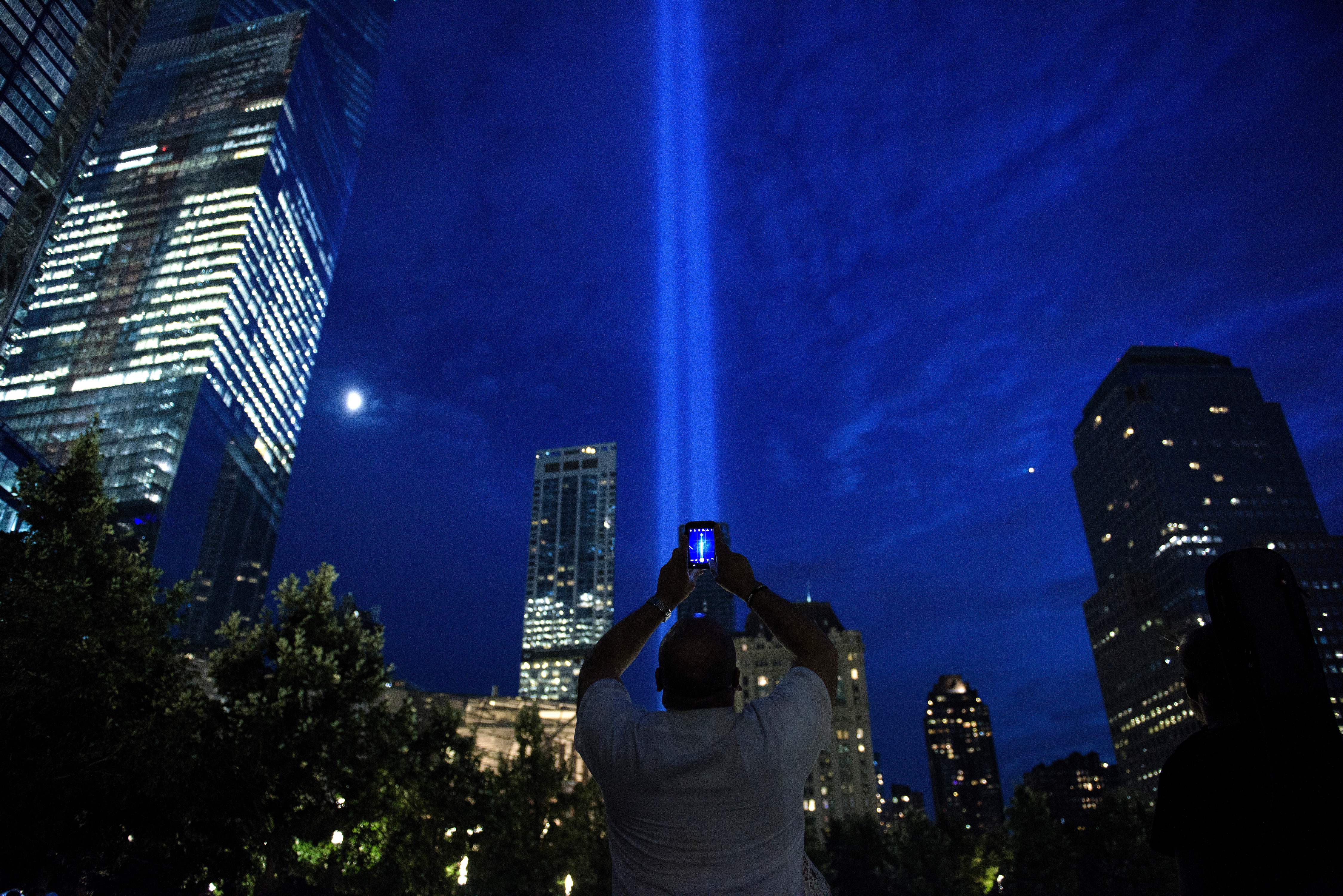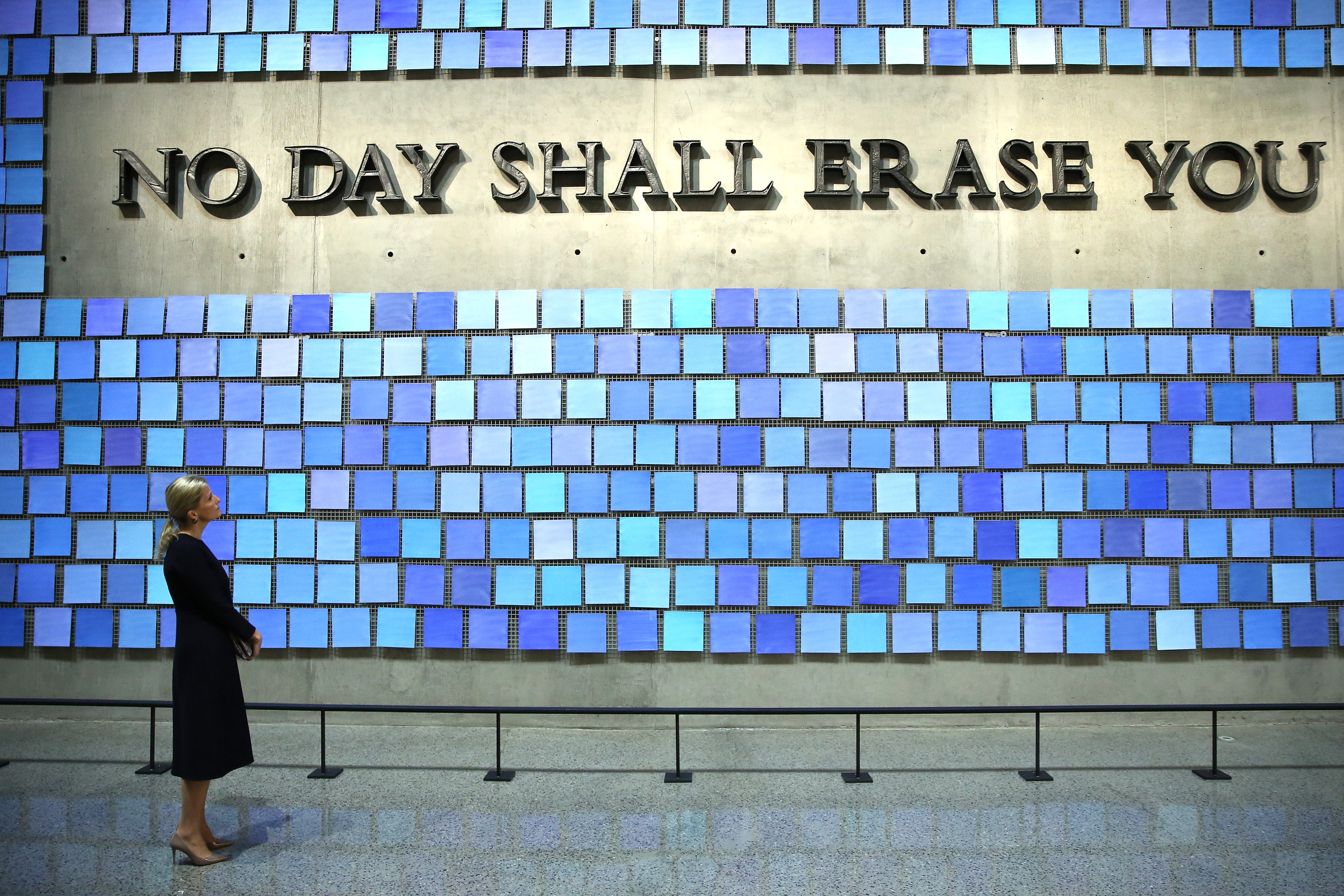Memories of one of the most tragic days in American history come flooding back for millions of people who watched the towers in New York City fall on September 11, 2001.
Matt Bocchi, who lost his father that day in 2001 when terrorists struck the World Trade Center, will never forget that day. His new book “Sway” is the first memoir told by a child of a 9/11 victim, and details the trauma he battled after he was told his father would never return home when he was 9 years old.

TOPSHOT – A man photographs beams of light symbolizing the two World Trade Center towers the night before the 15th anniversary of the September 11, 2001 terrorist attacks in the United States on September 10, 2016 in New York, New York. / AFP / Brendan Smialowski (Photo credit should read BRENDAN SMIALOWSKI/AFP via Getty Images)
While “Sway” offers a message of hope, Bocchi’s path to happiness was mired by suffering — the tragic death of his father, then sexual abuse by a family member followed by years of drug and alcohol addiction to try and numb the pain.
Bocchi’s father worked in the north tower at Cantor Fitzgerald, which was located on the 101st to 105th floors of the building, just above the impact zone of the hijacked plane. In an interview with the Daily Caller, Bocchi recounts what that day in 2001 was like for him as a child when the attack unfolded while he was at school.
“The superintendent came into the classroom and brought me and another student in the class into a hallway, where we met with my brother and that student’s younger brother. They brought us to a classroom and told us ‘the plane hit your father’s building, and they’re safe and evacuating the building.’ They didn’t know much more at that time,” he remembers.
He vividly recalls arriving home later that day to signs of chaos: a street and driveway strewn with cars haphazardly parked wherever there was space. Inside was his mother and family members, and Bocchi caught a glimpse of the footage from the scene in Manhattan on a television screen.
Amid the confusion, Bocchi didn’t get a firm response on what had really happened. He didn’t know that his father had called his mother for the last time to say goodbye.
“He said he loves her and will always love her. My uncle also called my dad and couldn’t get through, and finally did. My father just said ‘Tony, I love you’. To my knowledge, that was the last person who spoke to my father.”
Bocchi and his younger brother called his father’s phone so many times that his mailbox said it was full in the time period that it was uncertain to him what his father’s fate was. A week later, officials arrived at his home to tell his family that they found his father and that he’s not coming home.
For the several years that followed, Bocchi undertook a quest to discover what happened to his father after getting unsatisfactory explanations from family. He wanted to know how he died, and sifted through videos, photos and documentaries to try and identify whether his father was one of the people huddled by windows or who jumped. Bocci began asking family members, including an uncle through marriage, who told him that his father was one of the people who jumped from the skyscraper.
After the uncle told Bocchi this, who was around 14 at the time, a grooming stage began, and soon after so did the sexual abuse.
“The sexual abuse went on for about a year and a half. I began to dabble with drinking and drugs. The substance abuse happened in college. I used them for years to forget 9/11 and the sexual abuse,” he said.
Bocchi used drugs to melt away the pain of losing his father and the sexual abuse. But one day, he realized he wasn’t remembering his father the way he would want him to by suffering. After graduating college, Bocci got sober and soon began speaking at high schools, telling his story. His uncle also served a prison sentence.
“My father would want me to enjoy life like he did, like driving a sports car on a nice sunny day, going to the beach with friends and family, enjoying a nice meal, that’s what he’d want. He wouldn’t want me sitting in my room, high on drugs, looking at this stuff. Even in sobriety,” he tells the Caller.
Bocchi is keeping his father’s legacy alive by enjoying the little things like his father would want him to. But he fears 9/11 may one day become a tragedy that is forgotten, especially after cancellation of tributes to victims, such as the reading of the nearly 3,000 victims’ names by family members, amid the coronavirus pandemic.
“For them to cancel that stuff is a slap in the face,” Bocchi says. “They never talked to 9/11 families about cancelling. A lot of [9/11 families] looked at it as a hurtful action because you promised you’d never forget, but here we are, nearly 20 years later, on our way to forgetting.” (RELATED: Live Tribute By Families Of 9/11 Victims Cancelled Due To Coronavirus Restrictions In New York)

NEW YORK, NY – NOVEMBER 11: HRH Sophie, Countess of Wessex visits The National September 11th Memorial Museum on November 11, 2015 in New York City. (Photo by Neilson Barnard/Getty Images)
Bocchi is 28 today and will never forget 9/11 or the challenges and grief he endured. He hopes his book is a glimmer of hope for people who have also faced their own trauma and are trying to move past it and shape their own destiny.
“My goal with writing the book was to share my story with people who may have experienced something similar. These events don’t define who you are. Your story is your story.”


